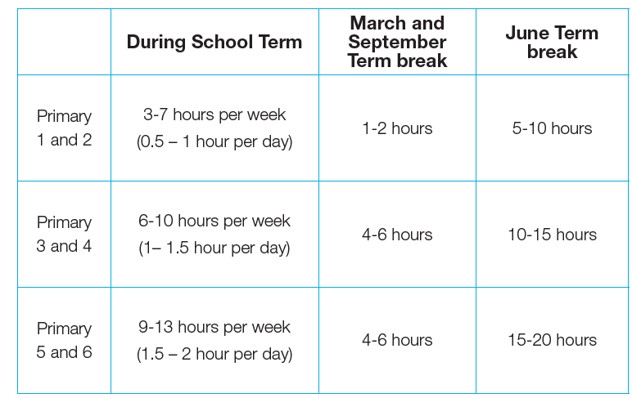Government agencies communicate via .gov.sg websites (e.g. go.gov.sg/open) . Trusted website s
Look for a lock ( ) or https:// as an added precaution. Share sensitive information only on official, secure websites.

Homework Policy
School Rules
School Hours
School Safety
Level Matters
Assessment Matters
School Bag Policy
Mobile Phone Policy
School Library Policy
Learning Devices Policy
MOE Financial Assistance Scheme
Student Care
School Canteen
School Vendors
School Canteen Advertisement
Purposes of Homework
Homework is an important component of the teaching-learning process. It aims to serve the following purposes:
a. stimulate thinking and develop ideas, initiative and creativity
b. reinforce and deepen understanding of lessons taught
c. allow students to regularly practise, and apply skills and concepts taught
d. inculcate responsibility for independent learning and encourage partnership with parents
e. encourage partnership with parents
Types of Homework
Homework should be varied in type in accordance with the needs of pupils and the objectives of the lessons. There can be different types of homework for a variety of purposes. Common examples are:
a. Practice Exercises:
Consolidation exercise e.g. maths, memorization of tables
Practising for mastery e.g. spelling words
Revising information about a current topic
Reading for pleasure
Essay writing
Drawing of pictures and diagram to summarize ideas and theories
b. Preparatory Homework:
Background reading
Researching topics for a class unit of work
Collecting items/ Gather data e.g. geometric shapes.
c. Extension Assignments:
Making or designing something e.g. an art work
Investigations e.g. Science, Social Studies, etc.
Researching e.g. history, local news
Collaborative Assignments like project work IT-based Homework
Recommended Homework Time
The table below shows the guide for homework time.

Communication with Parents/Guardians
Homework may be recorded by the pupil in the Pupils’ Companion and messages can be recorded by the teacher(s) and parents as well.
Parents are requested to inform the teacher if their children are having difficulties with the homework given.
If homework cannot be completed within the estimated duration of time given, do allow some extra time of about 10 mins. If the homework is still incomplete, the pupil should offer a valid reason to their teachers.
If a pupil repeatedly fails to do homework, the teacher will contact the parent to discuss the problem.
Good Homework Practices
Select a well-lit, comfortable and quiet spot in your home and make it a designated homework area.
Ensure that the necessary stationery is available.
Establish routine study hours
Encourage your child to complete homework given on time.
Government agencies communicate via .gov.sg website (e.g. go.gov.sg/open). Trusted websites
- SchoolFinder
- CourseFinder
- Academic calendar
- Quick links
- My shortlisted (0)

Measures to reduce homework load of students
Last Updated: 03 Nov 2021
News Parliamentary Replies
Name and Constituency of Member of Parliament
Mr Christopher de Souza, Holland–Bukit Timah GRC
To ask the Minister for Education what changes can be made to the school curriculum so as to lessen the amount of homework given that may exacerbate stress and anxiety during the COVID-19 endemic.
1. MOE is closely monitoring the disruptions to schooling caused by COVID-19 and has taken steps to ensure that students' learning and well-being are not unduly compromised.
2. School leaders and teachers are mindful of the need for students to have a balanced life even during the pandemic, with adequate time for family bonding, personal interests and rest. They are therefore mindful of the need to keep homework load manageable. Every school has an established homework policy that addresses such needs, with school-based measures to manage and coordinate the amount of homework.
3. Beyond homework, there are also other sources of stress in students' lives during the pandemic. By keeping schools open as far as possible, and ensuring that learning can still continue under Home-Based Learning (HBL) conditions, we provided students with a sense of normalcy and sustained social connections, which have been helpful to easing their anxieties.
4. When students return to school from extended HBL, the emphasis in schools is on checking on their well-being and curriculum recovery, and not on rushing to complete the syllabus or prepare for assessment. That is why we have cancelled the Primary 3 and Primary 4 year-end examinations and removed the Common Last Topics from national examinations. These decisions have also been helpful to safeguard students' development and well-being.
5. Through these efforts, we seek to help our students cope with the stress and anxieties exacerbated by COVID-19 disruptions.

IMAGES